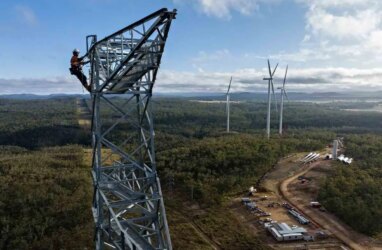Feed aggregator
DAC price seen hitting $50/t mark by 2035, driven by clean fuel mandates
INTERVIEW: Biomass-based CDR will decarbonise US economy more effectively than corn, soy-based biofuel production
EU biodiversity credits will be used for offsetting, MEP predicts
Researchers cut to the heart of cement decarbonisation with steel waste, not energy efficiency
Europe’s first CO2 carrier ship sails to completion, in step forward for regional transport network
Motorists abandon cars as 'worst wildfire in decades' rages near Jerusalem – video
Police and military personnel were seen helping people evacuate the highway connecting Jerusalem to Tel Aviv as wildfires raged. Israel's prime minister, Benjamin Netanyahu, declared the situation a national emergency as the fire threatened to reach the city. Israel’s Magen David Adom (MDA) rescue agency said they treated about 23 people, 13 of whom were taken to hospital
Continue reading...Solar panels to be fitted on all new-build homes in England by 2027
Government to press ahead with net zero plans as Keir Starmer rejects Tony Blair’s criticisms of climate policy
Almost all new homes in England will be fitted with solar panels during construction within two years, the government will announce after Keir Starmer rejected Tony Blair’s criticism of net zero policies.
Housebuilders will be legally required to install solar panels on the roofs of new properties by 2027 under the plans.
Continue reading...Queensland unveils strict new wind and solar rules: No development application without council deal
The post Queensland unveils strict new wind and solar rules: No development application without council deal appeared first on RenewEconomy.
Airlines urged to lock in credits ahead of CORSIA price surge
INTERVIEW: Japan’s blue carbon market could set example for world
Arctic plant study reveals an ‘early warning sign’ of climate change upheaval
A warming tundra has seen unexpected shifts, raising the alarm about fragile ecosystems and those who rely on them
Scientists studying Arctic plants say the ecosystems that host life in some of the most inhospitable reaches of the planet are changing in unexpected ways in an “early warning sign” for a region upended by climate change.
In four decades, 54 researchers tracked more than 2,000 plant communities across 45 sites from the Canadian high Arctic to Alaska and Scandinavia. They discovered dramatic shifts in temperatures and growing seasons produced no clear winners or losers. Some regions witnessed large increases in shrubs and grasses and declines in flowering plants – which struggle to grow under the shade created by taller plants.
Continue reading...Mosquitoes in Scotland as far north as Shetland
The BBC is utterly beholden to the right. Why else would it fear a podcast about heat pumps? | George Monbiot
The broadcaster behaves like Starmer’s government: suppress the left, cave to your critics, and undermine your own survival
It’s no longer even pretending. Last week, the BBC, already the UK’s most prolific censor, instructed the presenter Evan Davis to drop the podcast he hosted in his own time about heat pumps. It was a gentle, wry look at the machines, with no obvious political content. But the BBC, Davis says, saw it as “steering into areas of public controversy”. It should cease forthwith.
So are BBC presenters banned from saying anything controversial? Far from it. Take an article published earlier this year by Justin Webb in the Times. It praised the “political genius” of Donald Trump, suggested that Democrats are now seen as the extremists, and claimed that Trump is widely regarded as “making [America] normal again”. The BBC was fine with that, and complaints about it were rejected.
Continue reading...Major airline looks to CDR units to meet 2030 goals
First batteries installed as Liddell’s shuttered coal plant morphs into green energy hub
The post First batteries installed as Liddell’s shuttered coal plant morphs into green energy hub appeared first on RenewEconomy.
“There is no going back:” AEMO bids goodbye to baseload grid and spins high renewable future
The post “There is no going back:” AEMO bids goodbye to baseload grid and spins high renewable future appeared first on RenewEconomy.
“There is a political war” to attract renewable hydrogen investment – and Australia is losing
The post “There is a political war” to attract renewable hydrogen investment – and Australia is losing appeared first on RenewEconomy.
Energy Insiders Podcast: The view from inside the gas industry
The post Energy Insiders Podcast: The view from inside the gas industry appeared first on RenewEconomy.
Victoria to legislate “first of its kind” 2035 renewable gas target for industrial use
The post Victoria to legislate “first of its kind” 2035 renewable gas target for industrial use appeared first on RenewEconomy.
Is Labor to blame for high energy prices? Or was this the perfect trap set by the fossil fuel industry?
The post Is Labor to blame for high energy prices? Or was this the perfect trap set by the fossil fuel industry? appeared first on RenewEconomy.










